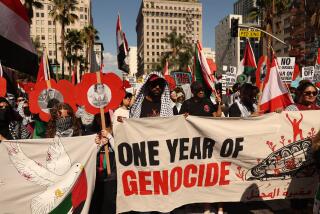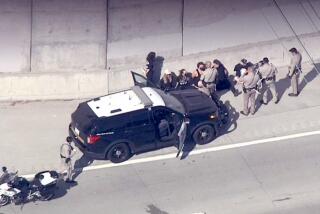News of War Sends Activists Into Streets With Cries of Protest : Dissent: Demonstrators in Los Angeles block traffic and rally at federal buildings. More than 150 are held.
- Share via
Anti-war activists in Los Angeles reacted instantly to news that war in the gulf had begun, responding to a call for a rally in Westwood at 5 p.m. and staging a more spontaneous demonstration at the downtown Federal Building that had been shut down by protesters earlier Wednesday.
Organizers called for protesters to gather at the Westwood Federal Building, and by 5:30 more than 150 had stopped traffic in the area, urging motorists to honk their horns in opposition to the military strike.
Earlier in the day, thousands of demonstrators--men in suits, youngsters in tie-dyed T-shirts and mothers holding the hands of children--cried their opposition to war at the Federal Building downtown. More than 150 people were arrested.
As news came that the war had started, some protesters burst into tears. One young woman sat alone on the sidewalk with her face buried between her knees.
“This is horrible,” cried Zebiba Shekhia, 26, of Long Beach.
Michael Young, a 20-year-old Boston resident whose brother is a Marine in the gulf, also cried.
“I am hurt, scared and very depressed,” Young said. “I don’t want my brother to die.”
As they gathered earlier Wednesday, the protesters chanted “No blood for oil” in a boisterous but generally orderly rally. They faced a force of more than 100 police officers and members of the Federal Protective Service.
Scores of the demonstrators pushed against a line of three dozen federal officers, but they were rebuffed time and again, mostly by sharp pokes with clubs. But about 12:45 p.m., some broke through the line and headed inside the Federal Building or sat down outside.
When police turned to chase them, other protesters followed and sat down. Federal officers grabbed them under the arms and dragged them inside, where they were handcuffed and put face down for several hours.
Blase Bonpane, director of the Office of Americans for Peace, was struck hard several times with clubs. Dressed in a suit, an angry Bonpane, in his 60s, said: “We’re trying to protest peaceably, and we’re getting the hell beaten out of us.”
Nicole Dillenberg, 28, of Los Angeles was crying as she sat on the floor waiting to be arrested. Holding out a bleeding hand, she pointed at one officer and screamed, “He smashed my hand. That’s what the First Amendment means in this country in 1991.”
The protests closed the Federal Building for at least 2 1/2 hours.
Federal Protective Service spokesman Mary Filippini said 158 protesters were arrested on charges of “creating a disturbance at a federal facility,” punishable by a fine of up to $25. All were cited and released, she said.
Filippini estimated that about 2,000 people had participated in Wednesday’s anti-war protest in Los Angeles, one of the largest of several across the nation in the final hours before President Bush ordered the start of what would come to be known as Operation Desert Storm.
In Boston, police arrested 50 protesters after they blocked traffic at several locations. About 100 demonstrators occupied the Washington state House of Representatives overnight, and several were carried out Wednesday. In Lafayette Square, across from the White House, demonstrators braved a morning drizzle to continue their anti-war protest.
Among those protesting in Los Angeles, Jim Grossman said it was his second day of missing work to express his opposition to war. The Woodland Hills real estate financier said, “We should give sanctions a chance. War is not the answer.”
Santa Monica City Atty. Robert M. Myers, a longtime activist, said the “most powerful” thing he can do is to engage in civil disobedience.
“Many people are outraged--the government is threatening to annihilate tens of thousands of civilians when we have not exhausted diplomacy. . . . It will tear the country apart,” Myers said.
Some were unimpressed by the anti-war demonstration.
Jesse Ruiz of Wilson High School, who was in Los Angeles to receive a football plaque at City Hall, watched with his teammates from afar.
“None of this is right. No one should go over there. It’s not our problem. Why should we risk thousands of lives for black oil? But why protest? They’re not getting through to anyone. The government’s got enough problems. It will not bring peace.”
Times staff writers Andrea Ford and John Kendall in Los Angeles and Mark A. Stein in San Francisco contributed to this story.
More to Read
Sign up for Essential California
The most important California stories and recommendations in your inbox every morning.
You may occasionally receive promotional content from the Los Angeles Times.













